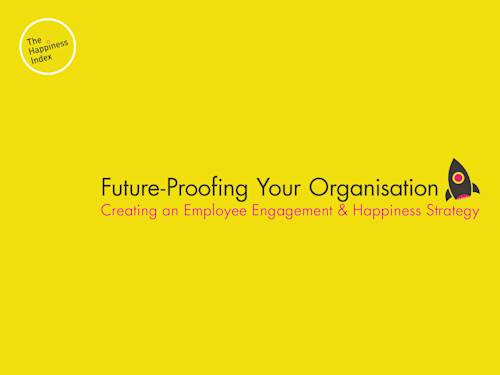
Creating an Employee Engagement AND Happiness Strategy
Let’s face it, the last few months haven’t been easy, and in some ways things may even look like they’re getting worse - rolling blackouts, the cost of living crisis, widespread strikes and even potential changes to employment law on the horizon. All of this means lots of uncertainty for both organisations and individuals. Great leadership is extra important at times like this. In this blog post we’ll look at why and how HR and Leadership teams can be supportive in uncertain times.
Change, uncertainty and turbulence all have negative impacts on humans. Although we can learn to manage change better, we’re hardwired to look for patterns and stability. This means that in times of change, our brains often react by feeling less safe and even sending us into fight or flight mode. This can have impacts on our productivity and our happiness.
However, employers and leadership teams are in a unique position to counter this. Recent research by the Edelman Institute shows that generally distrust is on the rise. The only exception to this rule is that 77% of respondents stated that they trusted their employer. Leadership and HR teams can leverage this trust to support their teams and their organisations as a whole.
If there’s one thing we’ve learned over the last few years with the pandemic, black lives matter protests and ever increasing scrutiny on climate change, it’s that people are focusing more and more on ESG. For leadership teams and organisations more broadly to retain and continue to build on this trust, they will need to focus on responsible leadership.
We already touched on the impacts that uncertain times can have on us. Let’s dive a little deeper into the neuroscience behind this topic.
As we discussed in our article on the neuroscience of change, when we feel less safe, whether that be because of circumstances at work or more generally, this activates our amygdala. This is one of the oldest parts of the instinctive brain, and can cause us to think less creatively and hamper productivity. Sadly because of the “fight” part of the fight or flight instinct, it can also impact working relationships, which can have a knock on effect on company culture for everyone.
Trust is an important component of safety, so if you can build trust within your organisation, this can go a long way to mitigating the impacts of uncertainty. Be open and honest with your team about how you plan to support them and also where you are limited by circumstances.
Relationships play a key role within organisations during times of change. This is because they can provide a sense of stability. Humans are highly empathetic animals, and we’re able to pick up on energetic connections from other people. When we’re around other negative people we feel more negative and when those around us are positive this builds us up. Of course, we don’t advocate for toxic positivity, no one can be positive all the time. What we’re saying is building positive and constructive relationships between teams, individuals and leadership is key to creating organisational resilience.
It might seem counterintuitive to double down on building social time into your organisation during times of uncertainty. But, it’s actually super important. You don’t need to fly everyone out to a Caribbean island for team building, but dedicating time for people to connect on a human level will make a huge difference.
One of the most important things you can do at times of upheaval is offer your team clarity. Although it’s important to speak to the instinctive and emotional brain types during times of change as described above, it’s also important to help your team activate their rational brain type. This can actually be more challenging as it takes more time and energy. By building clarity about organisational impact (what you’re all doing to change the circumstances!) and having clear communication flow (explaining where you’re at as an organisation) you can support your team.
Whatever challenges you’re facing, whether it’s internal organisational change or more global issues, it’s vital that your leadership team doesn’t “disappear”. Although change will put more pressure on leadership and HR, sending regular and clear communication is key. Even if you’re just telling people that you don’t have the answers yet, but are taking these steps.
For more information about managing change using neuroscience, check out this fascinating conversation with our Head of Neuroscience, Clive Hyland.
We’ve seen how the brain reacts to times of change and instability and how we can mitigate some of these effects. But we wanted to share some concrete steps you can take to support your team during difficult times.
Remember, although global or political circumstances will affect your team, there will always be people in your organisation going through personal times of change, so these tips can come in useful at any time!
Build in regular times that you can listen to your team, and really get to understand how the change is affecting them personally. Everyone is different so try not to be prescriptive about how people will be reacting to change. You can see more about this in our article about the death of Queen Elizabeth II.
Our Employee Voice survey provides a useful space for people to share how they’re feeling anonymously. And you can use our dashboards to understand how people across your organisation are feeling. Another useful tool might be senior leadership office hours, as this will encourage positive relationships between leadership and the wider team.
More on the importance of empathetic leadership here.
Listening is only half of the story. Make sure you feedback any findings from your listening to help your team see that you’re understanding and supporting. It’s really important that you show your team this isn’t simply a tick box exercise but that you truly care.
Ensuring that you have regular feedback systems and that your team knows what methods are in place for this. Our “closing the feedback loop” tool is really helpful for this because you can speak directly to your people and protect their anonymity.
Clarity of communications is also really key. When there are times of uncertainty or challenge you may not be able to fix all the problems you want to, or to be able to do so right away. Helping your team understand what you’re planning to do, any timelines for change, and potential roadblocks will be very useful.
At The Happiness Index, one of our incredible senior leadership team, Noelle, coined the phrase “Share Not Scare” for this. It means being open and honest with the intention of explaining the situation rather than scaring your people. Since you (hopefully!) employ adults this will help build trust in your team.
We love listening at The Happiness Index. But there’s no point if you’re not also walking the walk. Offering a roadmap and working through problems proactively rather than waiting for crises to hit will go a long way to supporting your team.
For example, if you know the energy crisis is going to affect your people, then explaining what support you can offer ahead of time will mean that your team will already know what help is on hand to support them through tough times.
One of the best things you can do during any uncertain times is offer flexibility. Whether you’re able to support your team by offering flexible schedules, work places, or hours. This will allow people to work around any problems that may come up for them personally.
We’ve already mentioned that everyone will be affected by change differently. Individuals within your organisation will have different responsibilities outside of work, different family circumstances and different resources available to them. Although you can’t offer individual support to everyone, by offering flexibility, you can help your team help themselves.
One final piece of advice I want to leave you with is that there is no right way of leading your team through times of disruption, change or challenge. There’s only the best way you can lead for the individuals on your team.
Don’t forget that HR and Leadership teams are also humans, and so you’re likely to slip up and make mistakes. It’s inevitable. The best thing you can do is be honest with your team, and share your mistakes and learnings and try to do better next time.
There is no magic bullet when it comes to this kind of thing! Our best advice is to listen to your people and try your best, and be willing to change direction if it becomes clear that that’s necessary.

Linked to Happiness in our neuroscience methodology... learn more
The Happiness Index helps organisations measure the key employee engagement AND happiness drivers to power their people strategy.
Our unique platform offers the products, insights and tools to shine a light on your cultural health and empower management to drive thriving cultures.
Our neuroscience-based pre-built surveys measure the full employee experience - from onboarding to exit to empower and enable organisations to understand their people and create data-led action plans.
